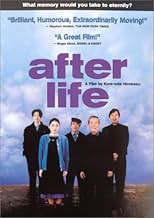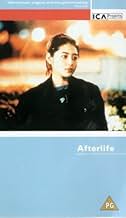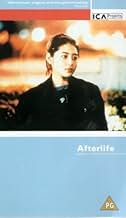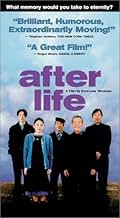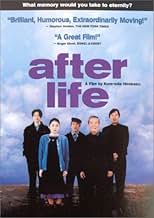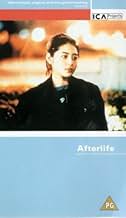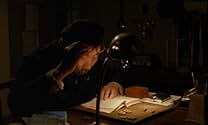IMDb RATING
7.6/10
15K
YOUR RATING
After death, people have a week to choose only one memory to keep for eternity.After death, people have a week to choose only one memory to keep for eternity.After death, people have a week to choose only one memory to keep for eternity.
- Awards
- 7 wins & 8 nominations total
Arata Iura
- Takashi Mochizuki, counselor
- (as Arata)
- Director
- Writer
- All cast & crew
- Production, box office & more at IMDbPro
Featured reviews
this movie was lovely. i could relate to the people and what they chose as their memories. i wanted to find a memory but i couldn't find one i would want to spend eternity with. so this movie has actually made me want to create beautiful memories before it is too late. see this movie, it might make you evaluate your own life.
10Ben-113
I really loved Kore-eda's first feature "Maboroshi No Hikari", so I had been looking forward very much to seeing "Afterlife" (named "Wandafuru raifu" in Japanese, after Frank Capra's movie "It's a wonderful Life") during its run in London.
At first I noticed that the film is formally very different from its predecessor; while "Maboroshi No Hikari" owes much to the influence of Ozu, and especially Hou Hsiao-hsien, "Afterlife" draws more on the directors background as a documentary filmmaker. What the two films share, however, is the theme of memory (Note: also a theme with Hirokazu Kore-eda's documentary work - check out "Without Memory", about a man suffering of severe amnesia). In "Maboroshi No Hikari" Yumiko is not able to forget the memory of her dead husband, whereas in "Afterlife" the recently deceased must chose one memory that will accompany them into eternity.
I feel that Kore-eda handles this entirely hypothetical premise in the best possible way, by steering completely clear of the stylistic superficialities with which so many other films about life after death desperately try to make themselves believable. The unspectacular old school building as a setting, the ceiling window with its interchangeable templates for the different stages of the moon, a character who himself has doubts as to whether this is really the best way of going to the next world and the absence of any religious connotations, among other things, all serve to keep the focus on the characters and their memories - many of whom are actually real. Apart from tongue in cheek humour, the lack of music also prevents over-sentimentalization and makes the memories the people recall the more sincere. The no-budget filming of the recollections of the deceased in order to trigger their personal memory, toward the end of the movie, also illustrates that the director is fully aware of his own limitations and possibilities as a film-maker. Rather than just trying to create the illusion of some half-baked version of the hereafter, he wants to challenge the viewer to reflect on what would be his/her most important memory - and succeeds in every way.
This is a movie that surly can be appreciated by anyone who possesses at least a tiniest inkling of openness and willingness to experience cinema as more than mere entertainment. Top mark for this one!
At first I noticed that the film is formally very different from its predecessor; while "Maboroshi No Hikari" owes much to the influence of Ozu, and especially Hou Hsiao-hsien, "Afterlife" draws more on the directors background as a documentary filmmaker. What the two films share, however, is the theme of memory (Note: also a theme with Hirokazu Kore-eda's documentary work - check out "Without Memory", about a man suffering of severe amnesia). In "Maboroshi No Hikari" Yumiko is not able to forget the memory of her dead husband, whereas in "Afterlife" the recently deceased must chose one memory that will accompany them into eternity.
I feel that Kore-eda handles this entirely hypothetical premise in the best possible way, by steering completely clear of the stylistic superficialities with which so many other films about life after death desperately try to make themselves believable. The unspectacular old school building as a setting, the ceiling window with its interchangeable templates for the different stages of the moon, a character who himself has doubts as to whether this is really the best way of going to the next world and the absence of any religious connotations, among other things, all serve to keep the focus on the characters and their memories - many of whom are actually real. Apart from tongue in cheek humour, the lack of music also prevents over-sentimentalization and makes the memories the people recall the more sincere. The no-budget filming of the recollections of the deceased in order to trigger their personal memory, toward the end of the movie, also illustrates that the director is fully aware of his own limitations and possibilities as a film-maker. Rather than just trying to create the illusion of some half-baked version of the hereafter, he wants to challenge the viewer to reflect on what would be his/her most important memory - and succeeds in every way.
This is a movie that surly can be appreciated by anyone who possesses at least a tiniest inkling of openness and willingness to experience cinema as more than mere entertainment. Top mark for this one!
Afterlife is another film offering an answer to the unanswerable question "What happens after you die? ". Although this has been asked many times through cinema in the past, few films have answered as elegantly as Afterlife.
Directly after dying the departed are received by a group of counsellors who assist them in finding what was, for them, the most beautiful and perfect, single experience of their lives. For some the choice is easy and they are instantly able to provide the moment, which, once recreated by technicians, they remain in forever but the majority of the film concentrates upon those who are unable to find their perfect moment, and need extra help to recall past loves and lost days of their youth. The institution has the perfect means to assist this choice, with the complete life of everyone on grainy home-video, perhaps a comment on the tehcnology and recording-obsessed Japanese.
Many of the scenes are visually exceptional, especially those in the snow and everything seems very real, and, ironically, down-to-earth, especially the school building being used throughout the film giving an institutional feeling, but the interaction between the staff is where the film holds its true strength. Especially interesting is the relationship between Shiori, a newly employed worker, and Mochizuki, her mentor, which develops throughout. The film is slow to start due to the documentary style often used, but proceeds in an enveloping manner holding your attention to the end. Along with "Heaven can wait" and "Beetlejuice" this film offers another novel look at life, death and the hereafter.
The Japanese title was "Wandafuru raifu" (wonderful life, after Frank Capra) and, even though the film is dealing with death, it is a statement of how wonderful life is.
I loved this film and it stuck me stunningly and reminded me of how good films can be when they try.
Directly after dying the departed are received by a group of counsellors who assist them in finding what was, for them, the most beautiful and perfect, single experience of their lives. For some the choice is easy and they are instantly able to provide the moment, which, once recreated by technicians, they remain in forever but the majority of the film concentrates upon those who are unable to find their perfect moment, and need extra help to recall past loves and lost days of their youth. The institution has the perfect means to assist this choice, with the complete life of everyone on grainy home-video, perhaps a comment on the tehcnology and recording-obsessed Japanese.
Many of the scenes are visually exceptional, especially those in the snow and everything seems very real, and, ironically, down-to-earth, especially the school building being used throughout the film giving an institutional feeling, but the interaction between the staff is where the film holds its true strength. Especially interesting is the relationship between Shiori, a newly employed worker, and Mochizuki, her mentor, which develops throughout. The film is slow to start due to the documentary style often used, but proceeds in an enveloping manner holding your attention to the end. Along with "Heaven can wait" and "Beetlejuice" this film offers another novel look at life, death and the hereafter.
The Japanese title was "Wandafuru raifu" (wonderful life, after Frank Capra) and, even though the film is dealing with death, it is a statement of how wonderful life is.
I loved this film and it stuck me stunningly and reminded me of how good films can be when they try.
This was a perfect film for watching on a quiet Sunday morning. It made me reflect on my own life, and realize that I would probably be one of the counselors in the afterlife.
It was brilliantly written and directed and one of the most innovative stories I have seen on screen. After death, you spend a week in a way-station to reflect on your life and take one memory with you. It is not an easy process as I discovered.
I was interested in the fact that some people can remember all the way back to the womb. Picking a happy memory before I was an adult is almost impossible for me, so I cannot imagine going back that far. Most people remember only to age three or four.
I was fascinated with the man who wanted to leave behind some evidence of his existence. One man could not remember any happy memories in his 70+ years, so he had to sit through video tapes, one for each year of his life, to help him. It seems that there was a connection with one of the counselors and this played out in an unusual way at the end. Choosing your best memory as the fact that you were someone else's best memory and that you made one person happy.
Most of us fall into the category expressed by one man. "I had a so-so education, a so-so job, a so-so marriage, and a so-so retirement." How do you pick a happy or important memory from that? I also liked one man's response when he picked his memory after lamenting that most of the memories of his life were bad. After being told he would forget all the bad memories, he exclaimed, "That truly is heaven." An unusual film that will be in my memory for a long time.
It was brilliantly written and directed and one of the most innovative stories I have seen on screen. After death, you spend a week in a way-station to reflect on your life and take one memory with you. It is not an easy process as I discovered.
I was interested in the fact that some people can remember all the way back to the womb. Picking a happy memory before I was an adult is almost impossible for me, so I cannot imagine going back that far. Most people remember only to age three or four.
I was fascinated with the man who wanted to leave behind some evidence of his existence. One man could not remember any happy memories in his 70+ years, so he had to sit through video tapes, one for each year of his life, to help him. It seems that there was a connection with one of the counselors and this played out in an unusual way at the end. Choosing your best memory as the fact that you were someone else's best memory and that you made one person happy.
Most of us fall into the category expressed by one man. "I had a so-so education, a so-so job, a so-so marriage, and a so-so retirement." How do you pick a happy or important memory from that? I also liked one man's response when he picked his memory after lamenting that most of the memories of his life were bad. After being told he would forget all the bad memories, he exclaimed, "That truly is heaven." An unusual film that will be in my memory for a long time.
"When we come to the last moment of this lifetime and we look back across it, the only thing that's going to matter is 'What is the quality of our love?" - Richard Bach
One of the most commonly reported aspects of near-death experiences is the life review, the seeing and re-experiencing of major and trivial events of one's life, sometimes from the perspective of the other people involved. Most say that the single most important lesson they learned is that the actions we think are trivial and unimportant turn out to be the most important, especially ones that involve spontaneous acts of love. While not exactly a life review, in After Life by Hirokazu Koreeda, a group of recently deceased people are asked to look back at their life and choose only one memory from their life that they want to take with them to eternity. The process compels people to look at their life in its entirety and see what worked and what was missing.
Set in a dreary barracks-like way station, civil servants meet with those just crossed over to help them choose the experience they want to hold on to. For some, the choice is easy, for others it is difficult. Those that will not or cannot choose are consigned to work in the substation with the newly deceased until they are ready to move on. The counselors work one on one with each individual telling them that they have three days to make their choice. Once a memory is selected, a film crew recreates the memory-- sets are built and the little touches of sights and sounds are selected until the deceased are satisfied that they are witnessing a perfect recreation of their experience. It is that film that they take with them, not the original memory.
At first some choose things such as a trip to Disneyland, a sexual encounter, or a memorable bowl of rice but later gravitate toward experiences that are more meaningful. The center of the film revolves around those who are unable to choose. Ichiro Watanabe (Taketoshi Naito) is a 70-year old management consultant who has led an uneventful life and is challenged to find a memory he thinks is worth preserving for all time. To help him in this process, he is allowed to scan through piles of videotapes representing each year of his life. One young man wants to choose a dream instead of an actual event. Another wants to forget his past entirely, and an elderly woman is stuck in the mindset of a nine-year old girl.
After Life is the story of the caseworkers as well. Takashi Mochizuki (Arata) has been stuck in limbo because he cannot find any happiness in his twenty-two years until he realizes how his short life deeply affected someone else. His perfect realization also affects a co-worker Shiori (Erika Oda) who has fallen in love with him. After Life is a beautiful and touching film that allows us to reflect on the things that brought us joy in our own life, and to recognize that true happiness lies, not in outward symbols of success, but in giving ourselves to others.
One of the most commonly reported aspects of near-death experiences is the life review, the seeing and re-experiencing of major and trivial events of one's life, sometimes from the perspective of the other people involved. Most say that the single most important lesson they learned is that the actions we think are trivial and unimportant turn out to be the most important, especially ones that involve spontaneous acts of love. While not exactly a life review, in After Life by Hirokazu Koreeda, a group of recently deceased people are asked to look back at their life and choose only one memory from their life that they want to take with them to eternity. The process compels people to look at their life in its entirety and see what worked and what was missing.
Set in a dreary barracks-like way station, civil servants meet with those just crossed over to help them choose the experience they want to hold on to. For some, the choice is easy, for others it is difficult. Those that will not or cannot choose are consigned to work in the substation with the newly deceased until they are ready to move on. The counselors work one on one with each individual telling them that they have three days to make their choice. Once a memory is selected, a film crew recreates the memory-- sets are built and the little touches of sights and sounds are selected until the deceased are satisfied that they are witnessing a perfect recreation of their experience. It is that film that they take with them, not the original memory.
At first some choose things such as a trip to Disneyland, a sexual encounter, or a memorable bowl of rice but later gravitate toward experiences that are more meaningful. The center of the film revolves around those who are unable to choose. Ichiro Watanabe (Taketoshi Naito) is a 70-year old management consultant who has led an uneventful life and is challenged to find a memory he thinks is worth preserving for all time. To help him in this process, he is allowed to scan through piles of videotapes representing each year of his life. One young man wants to choose a dream instead of an actual event. Another wants to forget his past entirely, and an elderly woman is stuck in the mindset of a nine-year old girl.
After Life is the story of the caseworkers as well. Takashi Mochizuki (Arata) has been stuck in limbo because he cannot find any happiness in his twenty-two years until he realizes how his short life deeply affected someone else. His perfect realization also affects a co-worker Shiori (Erika Oda) who has fallen in love with him. After Life is a beautiful and touching film that allows us to reflect on the things that brought us joy in our own life, and to recognize that true happiness lies, not in outward symbols of success, but in giving ourselves to others.
Did you know
- TriviaMuch of the action in After Life is shown as interviews conducted with the recently deceased regarding their lives. Some of these interviews were scripted, but many were done impromptu, with real people (not actors) reminiscing about their own lives.
- Quotes
Kenji Yamamoto, who wants to forget his past: Say I choose a memory, from when I was eight or ten years old. Then I'll only remember how I felt back then? I'll be able to forget everything else? Really? You can forget? Well, then that really is heaven.
- How long is After Life?Powered by Alexa
Details
Box office
- Gross US & Canada
- $801,985
- Opening weekend US & Canada
- $11,791
- May 16, 1999
- Gross worldwide
- $801,985
Contribute to this page
Suggest an edit or add missing content




